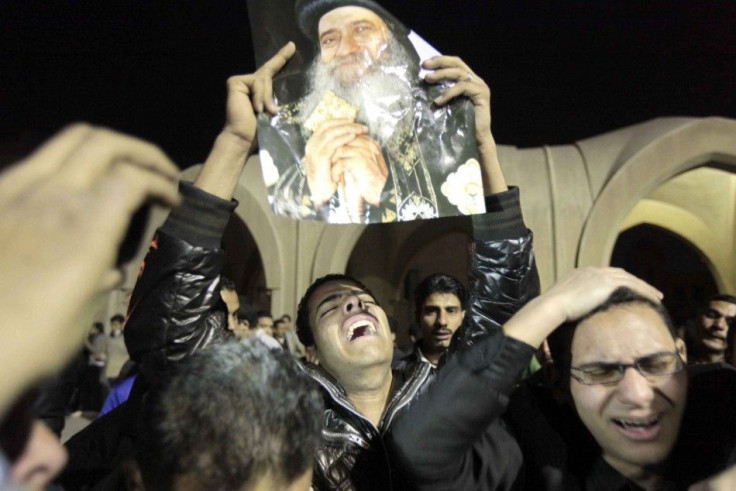Egypt's Coptic Christians: Governed By Islamists, In Search Of A New Leader

A poll on Monday took Egypt’s Coptic Christians one step closer to selecting a new patriarch.
At St. Mark’s Cathedral in the capital city of Cairo, a list of five papal candidates was put to a ballot to be whittled down to three. On Nov. 4, a new man will become the 118th Pope of Alexandria and Patriarch of All Africa in the Holy See of St Mark the Apostle.
The ascension of a new leader is of paramount importance to the Coptic community as Egypt’s leaders struggle to establish a governmental framework that accommodates the demands of an Islamist majority without alienating religious minorities.
Of more than 2,400 people who voted on Monday -- composed mostly of high-ranking male and female dignitaries and clergy members, all chosen by the church -- each cast a ballot for one of five papal candidates: three monks and two bishops between the ages of 49 and 70.
The three who garner the most votes will have their names placed in a box atop an altar in St. Mark’s Cathedral. Then, in accordance with a centuries-old tradition, a blindfolded child will randomly choose one of them in a Sunday ceremony, determining the new patriarch of the Egyptian Christian community.
Pope Shenouda III was the last to hold the papacy in Egypt. The popular and charismatic leader died in March at the age of 88; he had been the pope for 40 years and was lauded by Copts and Muslims alike for his efforts to encourage inter-faith dialogue.
The new pope will not only be charged with presiding over ecclesiastical affairs for Egypt’s Copts; he will also be a spokesperson for the religious minority in a country where Islamists have recently been elected to lead the post-revolution government.
Paul Sedra, a Middle East expert and associate professor of history at Canada’s Simon Fraser University, explains that recent popes have set a high bar for the newcomer.
“Thanks in large part to Shenouda’s example, as well as that of his predecessor, Kyrillos VI, the Coptic Orthodox community in Egypt now demand far more from their pope than they have at any time in the modern era,” he said in an essay for Egypt Independent.
“Whereas a century ago, the Coptic community had a vigorous, politically active lay [non-clergy] leadership, the clerical hierarchy has now assumed much of the responsibility for communal leadership that once belonged to the laity.”
And in times like these, that burden is heavier than ever. Coptic Christians, who make up about 10 percent of Egypt’s population, feel isolated by the ascendancy of the Muslim Brotherhood in Egypt, which is represented by the Freedom and Justice Party that swept parliamentary elections early this year.
The Egyptian Parliament was dissolved by the courts in June, but the administration of the Islamist President Mohamed Morsi still runs the country. An assembly charged with drafting the country’s new permanent constitution, which consists mostly of former MPs but continues to narrowly avoid dissolution, is dominated by Islamists. The document is still being drafted amid heated debates between moderate Muslims, hard-line Islamists, Christians and secularists.
Morsi and his moderate Islamist peers have promised to protect minority rights, but Egypt’s Christians remain skeptical. They often take part in anti-government protests; most recently, they made up a significant faction of the 10,000 citizens who rallied in Cairo to protest the selection of a conservative Islamist to lead the Freedom and Justice Party.
The rights of Coptic Christians and other religious minorities are in limbo as long as the constitution remains unwritten. In this context, the selection of a new patriarch is critical -- a strong leader could give Egypt’s Christian community the strength and solidarity it needs to assert itself as a formidable bloc in Egypt’s post-revolution struggle.
“The Coptic community is currently witnessing a flourishing of activism beyond the precincts of the church,” writes Sedra.
“And for the church to coordinate with lay organizations would benefit both the clergy and the laity -- particularly in the face of the struggles for equality in citizenship that Copts are currently waging.”
© Copyright IBTimes 2024. All rights reserved.






















